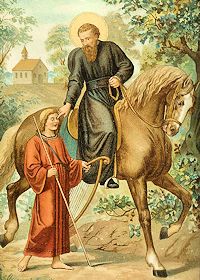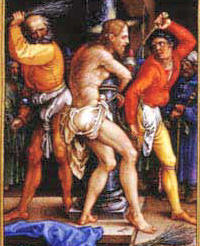Lent: March 26th
Saturday of the Second Week of Lent
Other Commemorations: St. Ludger, Bishop (RM)
» Enjoy our Liturgical Seasons series of e-books!
"If your virtue goes no deeper than that of the scribes and pharisees, you will never get into the kingdom of heaven (Matt. 5:20)." The need to make reparation is a vital, inescapable urge of a free person. His very nature cries out for order and peace. His reason tells him that where an order has been violated, the order must be repaired; and the higher the order, the greater must be the reparation. To be free at all, is to accept the responsibility for atonement. Sin is a violation of God's order. Sin demands reparation — the reparation of personal penance, personal prayer, personal charity to all. Part of our atonement to God is made by serving our fellow men. — Daily Missal of the Mystical Body
Meditation
The story of the Prodigal Son is repeated again today. It is the history of the Church; it is the history of our own desertion. In this Gospel we are given an urgent call to repentance and conversion. "Father, I have sinned." Penance alone can save us. Our Father welcomes us with mercy. The sin and its eternal punishment are forgiven; the good works which we did before sin and the merits which we lost through sin are revived. The Father receives us again as His children, and celebrates a joyful banquet with us at Holy Communion.
In the story of each human life, God's mercy stands on one side and the unfaithfulness of man on the other. Will God have to cast us off as He did the people of Israel? Have we not fully deserved it? Sometimes it appears that God wishes to allow our faithless generation to go its own way. If He does, it will merit a well deserved punishment.
What can save us from rejection? Only penance, self-examination, and conversion. "Be converted to Me with all your heart, in fasting and in weeping and in mourning" (Joel 2:12).
Excerpted from The Light of the World by Benedict Baur, O.S.B.
Things to Do:
- The parable of the lost sheep and the prodigal son in today's Gospel are both very important for your children to learn by heart. The well-known Catechesis of the Good Shepherd for children was developed by Sofia Cavaletti, a Roman Catholic Hebrew scholar who spent 30 years researching the religious development of children, and Gianna Gobbi, an educator who was trained by Maria Montessori. Through her observation of children's responses to different religious themes, Cavaletti found that an overwhelming number of younger children responded especially well to depictions of Christ as the Good Shepherd. Here is a brief article discussing the increasing prevalence of this religious program today. Find out more about this curriculum and try it with your own children. If you are pressed for time, find out about the nearest (Catholic) Good Shepherd program and consider enrolling your child.

The Station is in the church of Sts. Peter and Marcellinus, two celebrated martyrs of Rome under the persecution of Diocletian. Their relics were brought to the church in 1256, and the church was restored the same year on order from Pope Alexander IV.
St. Ludger
 St. Ludger was born in Friesland about the year 743. His father, a nobleman of the first rank, at the child's own request, committed him very young to the care of St. Gregory, the disciple of St. Boniface, and his successors in the government of the see of Utrecht. Gregory educated him in his monastery and gave him the clerical tonsure. Ludger, desirous of further improvement, passed over into England and spent four years and a half under Alcuin, who was rector of a famous school at York.
St. Ludger was born in Friesland about the year 743. His father, a nobleman of the first rank, at the child's own request, committed him very young to the care of St. Gregory, the disciple of St. Boniface, and his successors in the government of the see of Utrecht. Gregory educated him in his monastery and gave him the clerical tonsure. Ludger, desirous of further improvement, passed over into England and spent four years and a half under Alcuin, who was rector of a famous school at York.
In 773 he returned home, and St. Gregory dying in 776, his successor, Alberic, compelled our Saint to receive the holy order of priesthood and employed him for several years in preaching the Word of God in Friesland, where he converted great numbers, founded several monasteries, and built many churches.
The pagan Saxons ravaging the country, Ludger traveled to Rome to consult Pope Adrian II, what course to take, and what he thought God required of him. He then retired for three years and a half to Monte Casino, where he wore the habit of the Order and conformed to the practice of the rule during his stay, but made no religious vows.
In 787, Charlemagne overcame the Saxons and conquered Friesland and the coast of the Germanic Ocean as far as Denmark. Ludger, hearing this, returned into East Friesland, where he converted the Saxons to the Faith, as he also did the province of Westphalia. He founded the monastery of Werden, twenty-nine miles from Cologne.
In 802, Hildebald, Archbishop of Cologne, not regarding his strenuous resistance, ordained him Bishop of Munster. He joined in his diocese five cantons of Friesland which he had converted and also founded the monastery of Helmstad in the duchy of Brunswick.
Being accused to the Emperor Charlemagne of wasting his income and neglecting the embellishment of churches, this prince ordered him to appear at court. The morning after his arrival the emperor's chamberlain brought him word that his attendance was required. The Saint, being then at his prayers, told the officer that he would follow him as soon as he had finished them. He was sent for three several times before he was ready, which the courtiers represented as contempt of his Majesty, and the emperor, with some emotion, asked him why he had made him wait so long, though he had sent for him so often. The bishop answered that though he had the most profound respect for his Majesty, yet God was infinitely above him; that whilst we are occupied with Him, it is our duty to forget everything else. This answer made such an impression on the emperor that he dismissed him with honor and disgraced his accusers.
St. Ludger was favored with the gifts of miracles and prophecy. His last sickness, though violent, did not hinder him from continuing his functions to the very last day of his life, which was Passion Sunday, on which day he preached very early in the morning, said Mass towards nine, and preached again before night, foretelling to those that were about him that he should die the following night, and fixing upon the place in his monastery of Werden where he chose to be interred.
He died accordingly on the 26th of March, at midnight.
—Excerpted from Lives of the Saints, by Alban Butler, Benziger Bros. ed. [1894]
Symbols and Representation: bishop holding a cathedral; bishop holding a church and a book; bishop reciting his Breviary; bishop with a swan on either side; bishop with a goose or geese
Patronage: diocese of Essen, Germany; diocese of Münster, Germany; Billerbeck, Germany; Helmstedt, Germany; Münster, Germany; Saxony, Germany; Werden, Germany; Bant-Rutten, Netherlands; Deventer, Netherlands; Dronten, Netherlands; East Frisia, Netherlands; Groningen, Netherlands; Hengelo, Netherlands; Lichtenvoorde, Netherlands; Loenen, Netherlands.
Highlights and Things to Do:
- Read more about St. Ludger:






